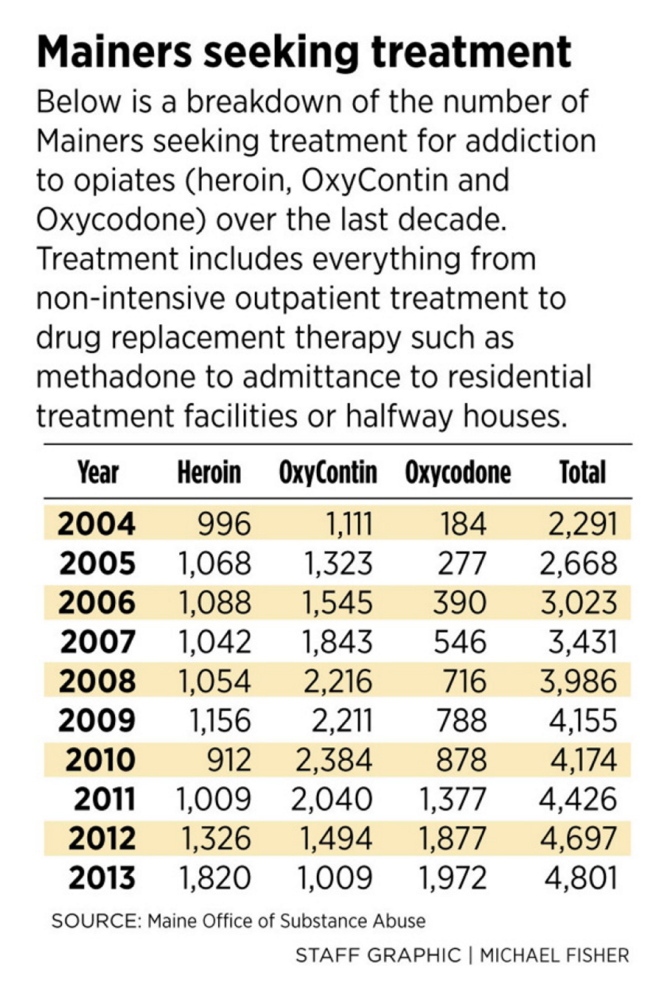Maine has the nation’s highest rate of prescriptions for long-term, extended-release opiate medications, according to a new study by the U.S. Centers for Disease Control and Prevention.
The study, based on data from 2012, shows that doctors in Maine wrote 21.8 such prescriptions per 100 residents – more than twice the national average of 10.3 prescriptions per 100.
Maine also ranked 11th nationally in its prescription rate for high-dose opioid pain relievers.
The study’s authors say their findings raise concerns because of the risk of overdoses and addiction, and suggest that regional patterns in prescription rates should be studied more closely.
“I think this is information for action, rather than just nice information to have,” said Dr. Leonard J. Paulozzi, a medical epidemiologist with the CDC and a co-author of the report.
Paulozzi said research suggests that long-term, extended-release opiates, including Oxycontin, fentanyl and methadone, are more likely to be abused and more likely to be associated with overdose deaths than other prescription drugs.
Long-term, extended-release opiates are not intended for use to treat acute pain, which lasts no longer than eight weeks, or for pain associated with surgery, Paulozzi said.
Maine has long struggled with opioid abuse, so the report did not surprise health professionals. Opiates are highly addictive and, as with many drugs, the body builds up a tolerance to them over time, requiring larger doses to produce the desired effects.
In October, the Trust for America’s Health, a nonprofit, nonpartisan health advocacy group, reported that from 1999 to 2010, Maine had a 96 percent increase in drug overdose deaths, mostly from prescription drugs.
Dr. Girard Robinson, senior vice president for medical and clinical affairs for Maine Behavioral Health, cautioned against using the new CDC report to tackle only the supply side of the state’s opioid problem. He said the state also must provide effective alternatives, such as chronic-pain management programs and addiction counseling.
“(Over-prescribing) should certainly be recognized as a problem, but it’s one piece of data,” Robinson said. “You need to have effective programs that deal with why people are needing these prescriptions to begin with.”
Dr. Kevin Flanigan, director of the state’s MaineCare services, said the state adopted new guidelines for MaineCare providers that have led to a decrease in opioid prescriptions. The changes, which took effect in 2013, decreased the maximum dosage of opiates that MaineCare will cover and prevented doctors from prescribing opiates for chronic pain without first trying other remedies, such as physical therapy or occupational therapy.
The guidelines also seek to change patients’ expectations that they should be 100 percent pain-free, Flanigan said.
“Maine clearly has made a shift in its approach to pain management, and that is having a big impact,” he said.
According to data provided by state Department of Health and Human Services, the number of patients who were prescribed opiate medications decreased 17 percent from 2012 to 2013.
There also was a 6 percent drop in opioid prescriptions covered by private insurers, but prescription rates increased for patients covered by Medicare and workers’ compensation, by 33 percent and 16 percent, respectively, according to the DHHS.
Flanigan could not pinpoint the reason why Maine ranked No. 1 in the country for prescribing long-term, extended-release opiate medication, but he speculated that it could be attributed to several factors, including patients’ expectations to be pain-free, doctors’ belief that fewer doses of a medication are better than more, and effective advocacy by manufacturers touting the safety of their drugs.
Flanigan said MaineCare’s new policies are working and could serve as a model for other medical providers.
“I think the report reinforces what Maine knew and recognized in 2012 and before, and it gives great credence to the steps we have taken in the last year and a half,” he said. “We’ve taken some very definitive actions and the providers and the patients have responded very positively to it.”
Send questions/comments to the editors.





Success. Please wait for the page to reload. If the page does not reload within 5 seconds, please refresh the page.
Enter your email and password to access comments.
Hi, to comment on stories you must . This profile is in addition to your subscription and website login.
Already have a commenting profile? .
Invalid username/password.
Please check your email to confirm and complete your registration.
Only subscribers are eligible to post comments. Please subscribe or login first for digital access. Here’s why.
Use the form below to reset your password. When you've submitted your account email, we will send an email with a reset code.